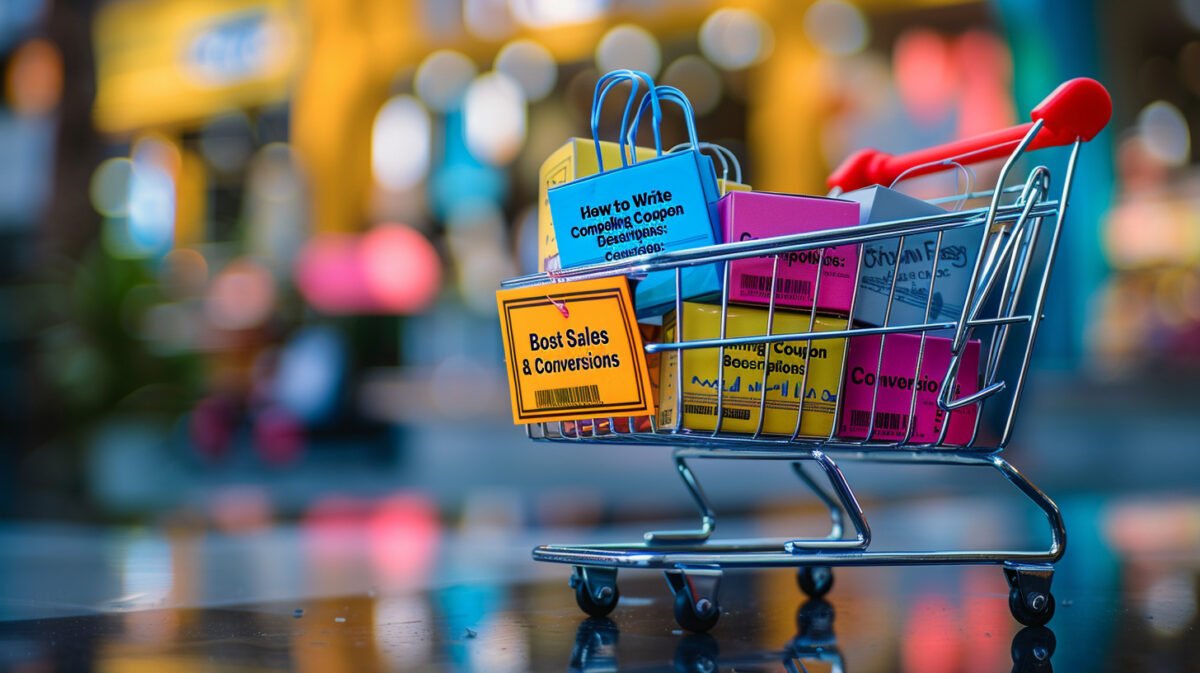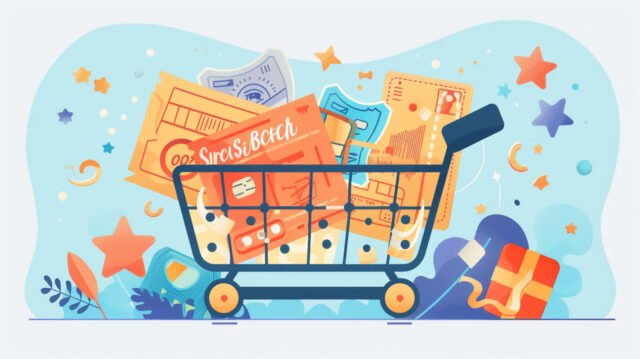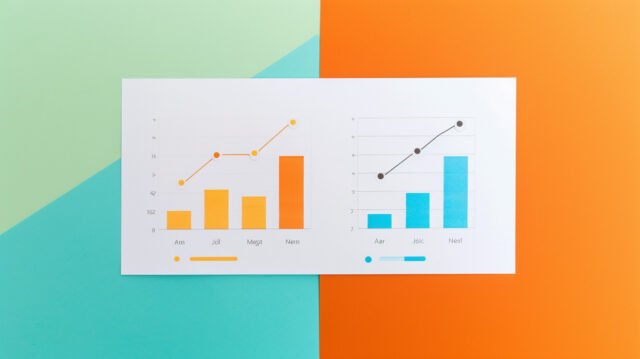
How to Write Compelling Coupon Descriptions: Boost Sales & Conversions
In the bustling digital marketplace, where consumers are bombarded with countless offers, coupons emerge as a beacon of value and savings. But a coupon is only as powerful as the words that describe it. A well-crafted coupon description can be the difference between a customer clicking “redeem” or scrolling right past your offer.
Think of it like this: your coupon description is the sales pitch for your discount. It needs to entice, inform, and ultimately, persuade. It’s not just about the percentage off or the dollar amount saved; it’s about weaving a narrative that makes your customers feel like they’re getting an exclusive, irresistible deal.
The Anatomy of an Irresistible Coupon
The most compelling coupon descriptions share a few key traits:
- Attention-Grabbing Headline: Like the title of a best-selling novel, your headline needs to hook the reader in.
- Crystal-Clear Value Proposition: Don’t just tell customers what they’ll save—tell them why they should care.
- Call to Action: A gentle nudge to “shop now” or “redeem today” can be the final push a hesitant shopper needs.
In this guide, we’ll delve into the art of writing coupon descriptions that captivate, convert, and keep customers coming back for more.

Understanding Your Audience: The Secret Sauce to Coupon Success
Before you even put pen to paper (or fingers to keyboard), it’s crucial to know who you’re writing for. Think of your target audience as the main character in your coupon story. What are their desires, pain points, and motivations?
The Art of Customer Profiling
Creating customer profiles, or “buyer personas,” is a fantastic way to get into the minds of your potential shoppers. Here’s how to get started:
- Gather Data: Use analytics tools, customer surveys, and social media insights to collect information about your existing customers. Look for patterns in demographics, interests, and purchase behaviors.
- Segment Your Audience: Divide your customers into distinct groups based on their shared characteristics. Are they bargain hunters, luxury shoppers, or perhaps busy parents looking for convenience?
- Craft Personas: Give each segment a name, a backstory, and a set of goals. What are their daily challenges? What kind of language do they use?

Speak Their Language
Once you have a clear picture of your ideal customers, it’s time to tailor your coupon descriptions to their unique needs and wants. Here are a few tips:
- Use the Right Tone: If you’re targeting millennials, a casual, witty tone might resonate. For a more mature audience, a professional, reassuring voice might be more effective.
- Highlight Relevant Benefits: A coupon for a luxury skincare product might emphasize its anti-aging benefits, while a coupon for a family-friendly restaurant might focus on its affordability and kid-friendly menu.
- Personalize When Possible: If you have the data, use your customers’ names or reference their past purchases in your coupon descriptions.
By understanding your audience inside and out, you’ll be able to write coupon descriptions that speak directly to their needs and desires, making your offers irresistible.
Crafting Compelling Coupon Descriptions: Words That Work Wonders
Now that we understand our audience, let’s dive into the nitty-gritty of writing coupon descriptions that truly sell.
Your First Impression
Your coupon headline is like a billboard on a busy highway. It needs to grab attention in a split second. Here’s how to make it irresistible:
- Numbers: People love seeing numbers, especially when it comes to savings. Use specific percentages (20% OFF) or dollar amounts ($10 OFF) to instantly convey value.
- Strong Verbs: Action words like “save,” “grab,” “unlock,” and “discover” create a sense of urgency and excitement.
- Benefits, Not Just Features: Instead of saying “50% off all sweaters,” try “Snuggle up in style with 50% off cozy sweaters.”
Where the Magic Happens
The body of your coupon description is where you flesh out the details and truly sell the benefits. Here’s what to focus on:
- Value Proposition: Clearly explain what the customer gets out of the deal. Will they save money? Get a free gift? Enjoy exclusive access?
- Persuasive Language: Use words that evoke positive emotions, like “enjoy,” “indulge,” “treat yourself,” or “experience the difference.”
- Social Proof: If you have testimonials or positive reviews, sprinkle them in to build trust and credibility.
Sealing the Deal
Your call to action (CTA) is the final push that gets customers to click that “redeem” button. Make it clear, concise, and compelling:
- Use Strong Verbs: “Shop Now,” “Redeem Today,” “Claim Your Discount” are all effective examples.
- Create Urgency: Add a time limit (“Offer ends soon”) or a limited quantity (“While supplies last”) to encourage immediate action.
- Make it Easy: Include a direct link to the product page or landing page where customers can redeem the coupon.

The Psychology of Couponing: A Deep Dive into Consumer Behavior
Why are coupons so effective? It’s not just about saving money. There’s a fascinating psychological element at play:
- The Thrill of the Hunt: Many shoppers enjoy the feeling of finding a great deal, and coupons tap into that innate desire.
- The Endowment Effect: Once we “own” a coupon, we’re more likely to use it, even if it’s for a product we weren’t initially interested in.
- The Fear of Missing Out (FOMO): Limited-time offers and exclusive deals create a sense of urgency that can drive impulse purchases.
By understanding the psychology behind couponing, you can craft descriptions that trigger these emotional responses and boost your conversion rates.
Measuring and Optimizing Your Results: Turning Data into Dollars
Writing compelling coupon descriptions is only half the battle. The other half is tracking their performance and making data-driven tweaks to boost your results.
The Metrics That Matter
When it comes to coupon descriptions, several key metrics can reveal how well your words are working:
- Click-Through Rate (CTR): How many people are clicking on your coupon after seeing it? A low CTR might mean your headline or call to action isn’t enticing enough.
- Conversion Rate: Of the people who click on your coupon, how many actually make a purchase? If your conversion rate is low, your value proposition might not be clear or compelling enough.
- Redemption Rate: How many coupons are actually being used? A low redemption rate could indicate that the terms of the coupon aren’t attractive enough or that there are barriers to redemption.
A/B Testing: The Scientific Approach to Coupon Optimization
One of the most effective ways to improve your coupon descriptions is through A/B testing. This involves creating two slightly different versions of your coupon description and showing each version to a different group of customers. Then, you compare the results to see which version performs better.
You can test different elements of your coupon description, such as:
- Headline: Try different words, phrases, or numbers.
- Value Proposition: Experiment with different ways of highlighting the benefits of your offer.
- Call to Action: Test different verbs, phrases, or levels of urgency.
By analyzing the results of your A/B tests, you can identify what works best for your audience and fine-tune your coupon descriptions for maximum impact.

Advanced Couponing Strategies: Taking Your Game to the Next Level
Once you’ve mastered the basics of coupon descriptions, you can start experimenting with more advanced strategies:
- Scarcity and Urgency: Limited-time offers and limited quantities can create a sense of urgency that drives action.
- Exclusivity: Make your customers feel special by offering exclusive discounts to VIP members or email subscribers.
- Gamification: Create a sense of fun and excitement by turning your coupon campaign into a game or contest.
By implementing these advanced strategies, you can take your coupon marketing to the next level and drive even more conversions.
The Power of Words Unleashed
As we’ve journeyed through the art and science of crafting compelling coupon descriptions, one thing is clear: words hold immense power. They can spark interest, ignite desire, and drive action. When harnessed effectively, they can transform a simple discount into an irresistible offer, turning casual browsers into loyal customers.
Your Coupon Description Checklist
Before you launch your next coupon campaign, run through this checklist:
- Know Your Audience: Tailor your message to their specific needs, wants, and pain points.
- Craft a Killer Headline: Make it attention-grabbing, benefit-oriented, and infused with strong verbs.
- Highlight Value: Clearly explain what the customer gets out of the deal, using persuasive language that evokes positive emotions.
- Strong Call to Action: Include a clear, concise, and compelling CTA that urges immediate action.
- Track Your Results: Monitor key metrics like CTR, conversion rate, and redemption rate, and use A/B testing to optimize your descriptions.
- Experiment with Advanced Strategies: Don’t be afraid to try new things, like incorporating scarcity, exclusivity, and gamification.
The Coupon Description: Your Brand’s Voice
Remember, your coupon description is more than just a marketing tool. It’s an extension of your brand’s voice and personality. By infusing your unique brand flavor into your descriptions, you can create a deeper connection with your customers and build a loyal following.
So, go forth and write coupon descriptions that not only drive sales but also leave a lasting impression on your customers. Let the power of words be your secret weapon in the competitive world of e-commerce.
I hope this comprehensive guide has equipped you with the knowledge and inspiration to write coupon descriptions that truly captivate and convert. If you have any questions or would like further guidance, don’t hesitate to ask!
FAQs
Is there a “magic formula” for writing coupon descriptions that always convert?
While there’s no one-size-fits-all incantation, there are definitely tried-and-true strategies that significantly boost your chances of success. Think of it less as a magic formula and more as a recipe with key ingredients: a dash of urgency, a sprinkle of exclusivity, a generous helping of benefits, and a pinch of personality. When you combine these elements in a way that resonates with your target audience, you create a recipe for coupon conversions that’s far more potent than any single “trick.”
How do I balance creativity with clarity when writing coupon descriptions?
It’s a delicate dance, but one worth mastering! The key is to let clarity lead, then creativity can follow. Start by clearly stating the offer and its value. Once that’s established, you can sprinkle in clever wordplay, humor, or imagery that aligns with your brand voice. Remember, the goal is to entice and delight, not confuse or mislead. If your creative flourishes obscure the core message, it’s time to dial it back.
What’s the biggest mistake businesses make in their coupon wording, and how can I avoid it?
The most common misstep is focusing on features rather than benefits. Instead of simply stating “20% off all shoes,” tell your customers how they’ll feel in those stylish new kicks or how they’ll benefit from that extra money in their pocket. Remember, people buy based on emotions and then justify with logic. So, tap into their desires and paint a vivid picture of how your coupon can enhance their lives.
Are there specific words or phrases that are scientifically proven to boost coupon redemption rates?
Absolutely! Words like “free,” “save,” “exclusive,” “limited time,” and “now” have been shown to trigger psychological responses that drive action. Additionally, using numbers (e.g., “50% off”) and creating a sense of urgency (“Today only!”) can further incentivize customers to redeem. However, it’s crucial to use these power words authentically and sparingly, as overuse can diminish their impact.
My product is high-end/niche. Should my coupon descriptions sound different than for mass-market goods?
Yes! Your coupon descriptions should always align with your brand voice and target audience. For high-end or niche products, focus on exclusivity, quality, and the unique experience your product offers. Instead of screaming “discount,” whisper “indulgence” or “reward.” Use sophisticated language and emphasize the value and prestige associated with your brand.

Hi, I’m Katie, and I’m here to make sure all our content is top-notch. I have a soft spot for a well-placed comma and a perfectly crafted deal description. Off the clock, I’m either curled up with a good book or experimenting with new cookie recipes.